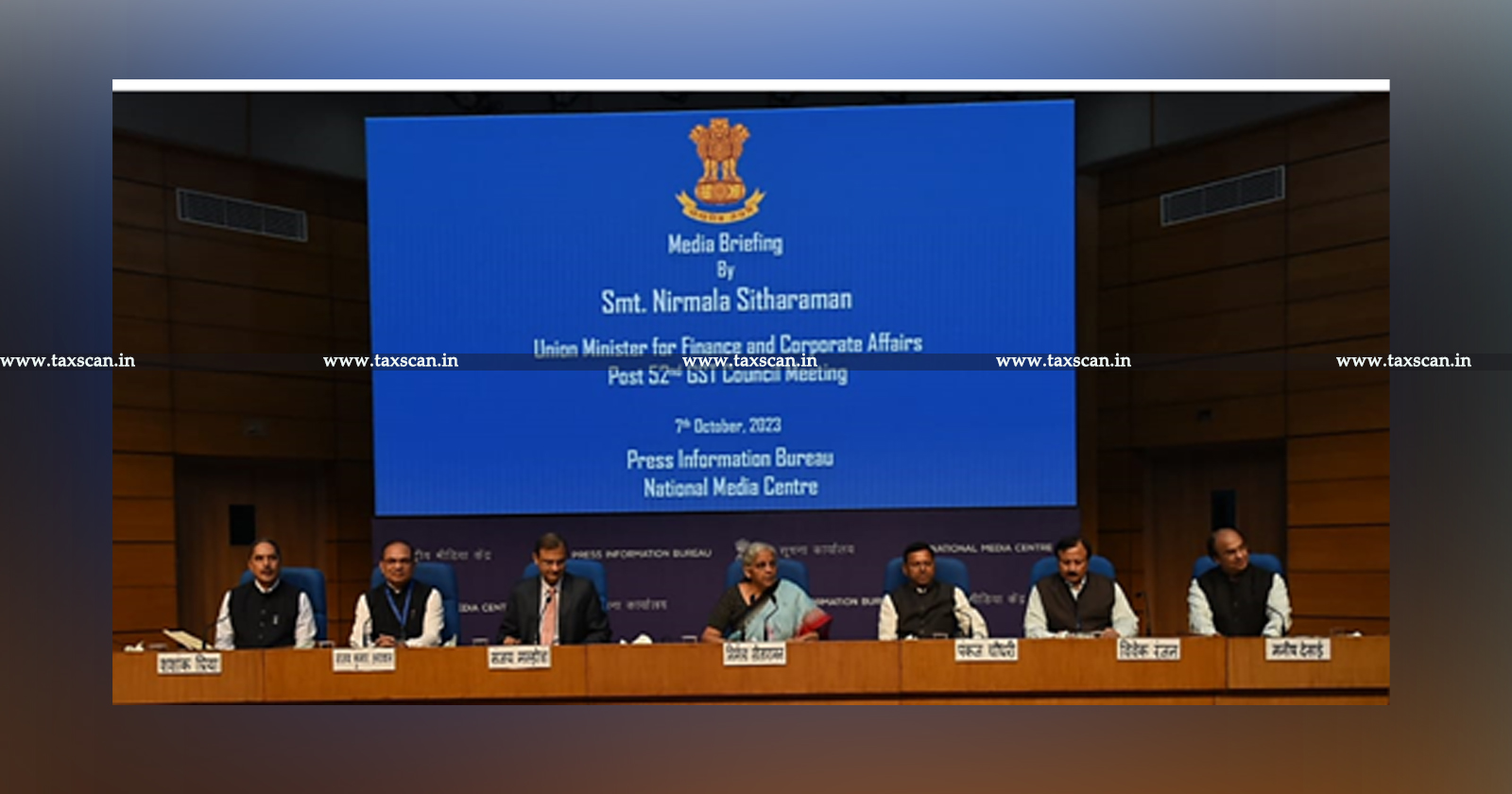GST Council's Goods and Services Tax Rate Recommendations: Comprehensive Overview

The 52nd meeting of the GST Council convened in New Delhi, with Union Minister for Finance & Corporate Affairs, Smt. Nirmala Sitharaman, presiding over the proceedings on 7th October 2023.
In attendance were Union Minister of State for Finance, Shri Pankaj Chaudhary, as well as the Chief Ministers of Goa and Meghalaya, who oversee the finance portfolios in their respective states. Additionally, Finance Ministers from various states and union territories with legislative assemblies, along with senior officials from both the Ministry of Finance and the states/union territories, participated in the meeting.
Read More: 52nd GST Council Meeting: Key Highlights
The GST Council, among other matters, put forth the following recommendations concerning adjustments in GST tax rates, initiatives to enhance trade facilitation, and actions aimed at simplifying GST compliance processes.
Recommendations relating to GST rates on goods and services
Changes in GST rates of goods and Clarifications
- GST rates on “Food preparation of millet flour in powder form, containing at least 70% millets by weight”, falling under HS 1901, with effect from date of notification, have been prescribed as:
- 0% if sold in other than pre-packaged and labelled form
- 5% if sold in pre-packaged and labelled form
- To clarify that imitation zari thread or yarn made out of metallised polyester film /plastic film, falling under HS 5605, are covered by the entry for imitation zari thread or yarn attracting 5% GST rate. However, no refund will be allowed on polyester film (metallised) /plastic film on account of inversion.
- Foreign-going vessels are subject to a 5% Integrated Goods and Services Tax (IGST) on the vessel's value when it transitions to coastal operations. However, the GST Council has suggested a conditional IGST exemption for foreign-flagged foreign-going vessels when they switch to coastal operations, provided they return to their foreign-going status within a six-month period.
Read More: GST Council Announces Zero GST for Loose Millets and 5% GST for Pre-Packaged and Labelled
- GST Council recommended keeping Extra Neutral Alcohol (ENA) used for manufacture of alcoholic liquor for human consumption outside GST. The Law Committee will examine suitable amendments in law to exclude ENA for use in manufacture of alcoholic liquors for human consumption from the ambit of GST.
- To reduce GST on molasses from 28% to 5%. This step will increase liquidity with mills and enable faster clearance of cane dues to sugarcane farmers. This will also lead to reduction in cost for manufacture of cattle feed as molasses is also an ingredient in its manufacture.
- A separate tariff HS code has been created at 8 digit level in the Customs Tariff Act to cover rectified spirit for industrial use. The GST rate notification will be amended to create an entry for ENA for industrial use attracting 18% GST.
Read More: Conditional IGST Exemption to Foreign-Flagged-Foreign-Going Vessels: GST Council
Changes in GST rates of services
- The entries at Sl. No. 3 and 3A of notification No. 12/2017-CTR dated 28.06.2017 exempts pure and composite services provided to Central/State/UT governments and local authorities in relation to any function entrusted to Panchayat/ Municipality under Article 243G and 243W of the Constitution of India. The GST Council has recommended to retain the existing exemption entries with no change.
- Further, the GST Council has also recommended to exempt services of water supply, public health, sanitation conservancy, solid waste management and slum improvement and upgradation supplied to Governmental Authorities.
- To clarify that job work services for processing of barley into malt attracts GST @ 5% as applicable to "job work in relation to food and food products”and not 18%.
Read More: GST Council cuts Tax on Molasses to 5%, Exempts Distilled Alcohol from Levy
- With effect from 1 January 2022, liability to pay GST on bus transportation services supplied through Electronic Commerce Operators (ECOs) has been placed on the ECO under section 9(5) of CGST Act, 2017. This trade facilitation measure was taken on the representation of industry association that most of the bus operators supplying service through ECO owned one or two buses and were not in a position to take registration and meet GST compliances. To arrive at a balance between the need of small operators for ease of doing business and the need of large organized players to take ITC, GST Council has recommended that bus operators organised as companies may be excluded from the purview of section 9(5) of CGST Act, 2017. This would enable them to pay GST on their supplies using their ITC.
- To clarify that District Mineral Foundations Trusts (DMFT) set up by the State Governments across the country in mineral mining areas are Governmental Authorities and thus eligible for the same exemptions from GST as available to any other Governmental Authority.
- Supply of all goods and services by Indian Railways shall be taxed under Forward Charge Mechanism to enable them to avail ITC. This will reduce the cost for Indian Railways.
Support our journalism by subscribing to Taxscan premium. Follow us on Telegram for quick updates


